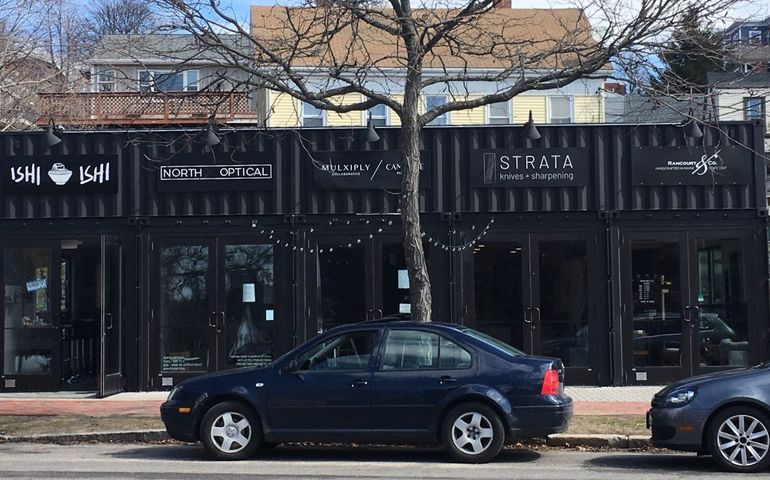
Tenants of innovative Black Box are microcosm of growing retail crisis
 Photo / Rebecca Milliken
Retail startup tenants of the Black Box on Washington Avenue in Portland are already feeling the effects of restrictions from the COVID-19 response.
Photo / Rebecca Milliken
Retail startup tenants of the Black Box on Washington Avenue in Portland are already feeling the effects of restrictions from the COVID-19 response.
The Black Box opened in November 2018 as the quintessential example of innovation in Portland's evolving retail and food industry — a startup incubator, and the city's first retail property made from shipping containers.
Now its a microcosm of what's happening all over the city and in much of the state. The six tenants in five units are working to stay afloat in the new world of COVID-19 response restrictions, and finding that an online presence doesn't take the place of brick-and-mortar commerce.
Tanja Cesh and Kristen Camp, who run the collaborative MULXIPLY and Campfire Pottery, say they've closed the door, literally, and are counting on online business. Cesh sells Maine-designed, Himalaya-inspired accessories and gifts made by fair-wage artists in Nepal. Camp sells ceramics she and her husband, Joe, create in their Westbrook studio.
"We shut our brick-and-mortar until further notice and are shifting our focus to online sales," they told Mainebiz in a joint email. "While we have a bit of traction there, our items are quite tactile and our space is very inviting so the online experience just isn’t the same."
Camp added, "While we are thankful to have the option of selling online, we rely heavily on the in-person interactions that our brick-and-mortar brings. The revenue of our small business not only supports our family, but our employees."
At Strata, which sells Japanese cutlery and also offers a whetstone sharpening service, owner Evan Atwell's services revolve around the local professional food industry and at-home cooks.
"Business is way down, plain and simple," he said.
The city of Portland Monday restricted all businesses where groups gather, and restaurants and bars can only offer dine-in service. While consumers are encouraged to get takeout, order deliveries and buy gift cards, the effects are being felt, even in businesses that don't serve food and drink.
The three owners all said the worst-case scenario is that they'll have to close. And at the very best, they'll feel the impact for months to come, even when restrictions are lifted. All of the tenants are in the middle of their current leases and, the Black Box, like many landlords and tenants, is looking at the situation day-to-day.
MULTIXPLY has two employees aside from owner Cesh, as does Campfire Pottery. Strata has two full-time employees aside from Atwell, and two season ones.
The Black Box is owned by the Dayton Group, which offers short-term leases in the five-unit 1,600-square-foot building. While it's serving its purpose as a retail incubator, it has also evolved into a hot spot for small businesses whose owners want small storefront space on Portland’s peninsula.
The Dayton Group, with offices down the street at at 75 Washington Ave., bought the property from Jed Harris, of Cotton Street Holdings, who first thought up the container-incubator, owners said when it opened. It was built by SnapSpace Solutions, of Brewer.
The other tenants are Rancourt & Co., a retail space for the Lewiston-based online shoe seller; North Optical, another original tenant; and Ishi Ishi Ramen, a nine-stool noodle shop that opened last month.
Starting Thursday, Ishi Ishi Ramen will have a limited menu with take-home ramen kits. Updates and hours will be posted on their Instagram page at @ishi_ishi_ramen.

Domino effects
MULTIXPLY and Campfire Pottery have shared a space at the Black Box since it opened. Strata opened a few months later.
The owners of the businesses said the lack of customers walking in their doors has ripple effects that will be felt long after the customers start coming back.
"With the restaurants closed, employees not only have less money to procure our products or services, but take care of themselves in general," Atwell said. "Many parents are stuck at home taking care of their kids, and have to pay for the additional food needed to feed them throughout the day. The snowball effect is easy to imagine.
"Throw in the fact that so many businesses need tourism to survive, and we're biting our nails about the impact this will have for summer business not only for ourselves, but the local economy."
He hasn't closed the doors, and has extensive sanitary protocols in place, and people can also buy services and products online and through the shop's Instagram account. The business is working as fast as possible to get its web store up, but that's still several weeks out.
"We've been lucky enough to establish relative financial stability quickly, since business has been strong up to this point, even in the winter months," Atwell said.
But there's plenty to worry about.
"The fairly unique nature of some of the products and arrangements we have with some makers requires us to always have product commitments that we must fulfill whenever they are delivered," he said. "If our suppliers start getting nervous about their own funds, and start increasing both the amount of product and frequency they ship to us to increase their revenue, we might start being dire straits if we can't at least match expenses to revenue for the next few months."
Cesh and Camp have similar concerns.
"We are concerned that the lack of cash flow will set us back for our spring and summer sale launches, which will affect our entire year as a business," Camp said. "This time of year we are pouring a lot of our resources back into our business to build and produce our inventory and to create new designs that are all handmade in our studio in Westbrook."
Small business, global issues
"We are specifically concerned with our current revenue flow, as that will help pay for our incoming orders we have committed to," Cesh said. "Our business model is unique in that we work with fair-wage artisans in Nepal. Our products are custom-designed, so when we place our orders, we are committing to fulfillment. Each of our artisans is paid, regardless of what is happening with our sales, which is overwhelming at this moment."
Cesh said her business has unique issues that are always a concern. "Even when we are not dealing with a world-wide pandemic, we are dealing with a vulnerable supply chain as we work with at-risk communities as part of our mission is to elevate artisan groups out of poverty," she said. "So the vulnerability is even riskier at this point for our product to be produced and shipped by our spring/summer launch."
The concerns about her business stretch around the globe. "The worst case scenario is that our artisans, who are in Nepal, fall ill," Cesh said. "We care about them and recognize that they live in a developing country that has a negligent government that cares very little for the welfare of its citizens. That of course means our products are delayed. We will likely lose wholesale orders as a result of this."
Community spirit
The business owners are hoping the same community spirit that has buoyed them in the innovative retail space will help until things get back to normal. They are offering free domestic online shipping, and are also urging thoughtful local buying, from them as well as other businesses.
"Large corporations will feel less impact than the small businesses," Cesh said. "We have staff we still want to pay even though we are shifting their jobs to things they can do from home. So the best way to support us is to buy our products online. Spread the word. Spread some cheer by buying a gift for a friend or family member that is ill."
Camp agreed that the best support would be from those who can afford to buy. "Our hope is that people who have the means to support us will continue to purchase our handmade goods and even send gifts to friends and family to encourage them during this difficult time," she said. "This will enable us to continue to pay our employees and support our family."
Atwell said they don't fault the restrictions. "I think it's really important to continue with social distancing and proper sanitary practices, but it's also super important to help support the local economy however you can," he said. "The sun is not going to be shining on a lot of business when we all step out of our hideaways when viral conditions settle down. Real-world expenses don't go away during this time, and there are going to be domino-like consequences for many of us if we don't do our part to continue to support local.
"Little purchases add up; anything helps right now," he said. "If you shop local, the money tends to stay local. So while it may be hard for many of us to make purchases right now, make the purchases you can make count, and buy local."
Cesh added, "The upside is the support we’ve received from local businesses and our global community. It’s a comforting feeling to know that none of us are going through this alone, even though we are all in isolation."









0 Comments